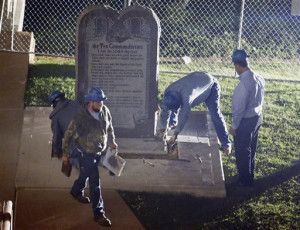Lawmakers in Oklahoma are pushing a ballot initiative to repeal a section of the state constitution that prohibits the use of taxpayer money or property to advance religion.
House Joint Resolution 1062, passed by the Oklahoma House of Representatives March 10 by a vote of 86-10, is a response to an Oklahoma Supreme court ruling last June ordering removal of a Ten Commandments monument on the state Capitol grounds.

Workers remove the Ten Commandments monument from its base on the grounds of the state Capitol in Oklahoma City, Monday, Oct. 5, 2015. The removal comes after the Oklahoma Supreme Court’s decision in June that the display violates a state constitutional prohibition on the use of public property. (AP Photo/Sue Ogrocki)
The lawsuit, filed in 2013 by a group of taxpayers led by Bruce Prescott, an ordained Baptist minister and former head of Mainstream Oklahoma Baptists, argued successfully that the privately funded monument erected in 2012 violated a section of the state constitution stating: “No public money or property shall ever be appropriated, applied, donated, or used, directly or indirectly, for the use, benefit, or support of any sect, church, denomination, or system of religion, or for the use, benefit, or support of any priest, preacher, minister, or other religious teacher or dignitary, or sectarian institution as such.”
Oklahoma’s “no-aid” provision is one of several state laws barring the use of public funds for religious purposes being debated in modern-day skirmishes over the separation of church and state.
Critics demean the laws as “Blaine Amendments,” named after a particular unsuccessful attempt to amend the federal Constitution during a period of history when many Protestant Americans were alarmed by increasing numbers of Catholic immigrants.
No-aid supporters in Oklahoma invoke another ugly chapter in U.S. history, a plan to assimilate relocated Native Americans by converting their children to Christianity in government-funded schools.
Mitch Randall, pastor of Cooperative Baptist Fellowship-affiliated NorthHaven Church in Norman, Okla., said in a blog March 10 that proponents of removing the no-aid provision either do not know or failed to learn from history.
“If successful, they will be taking a big step backwards in returning our state to a time when religious persecution was acceptable under Colonialism and Native Americans were forced to worship as those in authority dictated,” Randall said.
Prescott, who identifies as a “post-denominational Christian” because he regards the differences between denominations less significant than the divides between conservative and progressive Christians in each denomination, now leads the Oklahoma Faith Network.
He and fellow plaintiffs including James Huff, a member at First Baptist Church in Oklahoma City and chapter advocate of Americans United for Separation of Church and State, said in their lawsuit they wanted the monument removed not because they object to the Ten Commandments but out of reverence for the Christian religion.
A lower court decision struck down by the Oklahoma Supreme Court had said the monument could stay because of its “historical,” rather than religious, significance. Prescott and the other plaintiffs called that logic a “co-option of their religious traditions, resulting in a cheapening and degradation of their shared faith.”
The high court agreed, determining that the Ten Commandments “are obviously religious in nature” and “an integral part of the Jewish and Christian faiths.”
